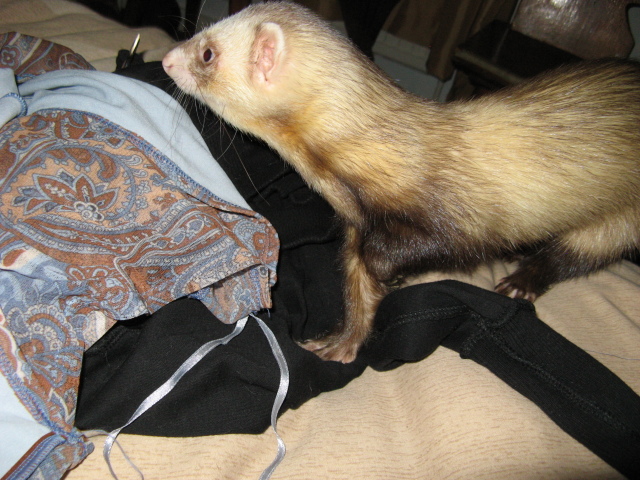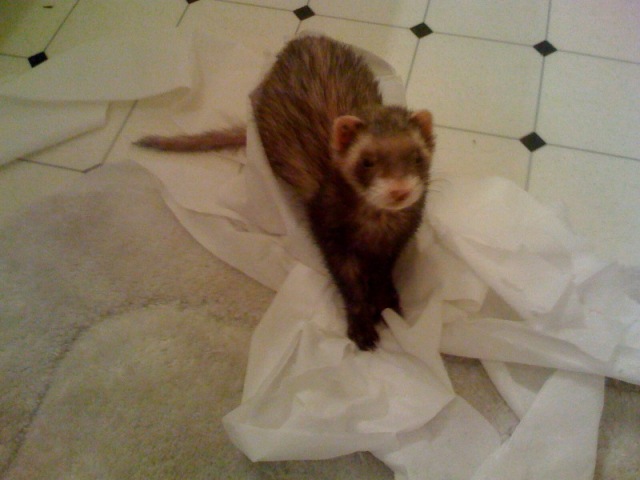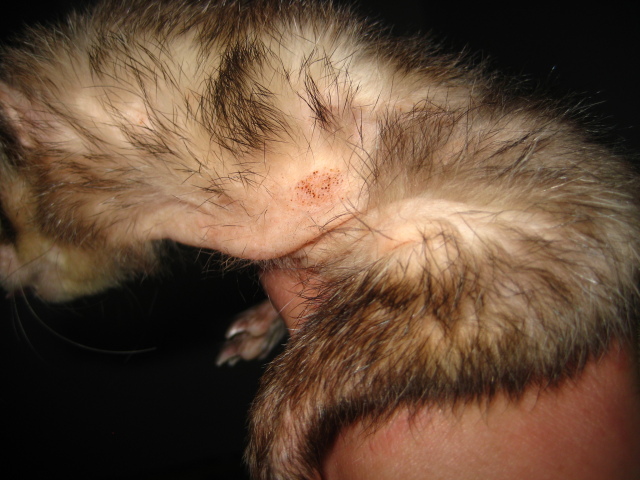QuestionHi Jacquie,
My name is Tess and I am the proud mother of three ferrets. I have a girl and two boys. My girl is 1 years old, one of my boys is 8 months, and one boy is 3 months. I have never taken any of them to the vet before, and none of them have been immunized, besides the standard shots they get from Marshall's. They have never had any health problems, or abnormal stools besides some slight thinning during shedding seasons. But a more regular brushing regiment and some ferret lax has always cured that. Lately however, since I have bought my third little boy, I have noticed that some stools in the cage are getting runny and slimy looking. A few have even had green patches. I caught my little boy hacking in his cage, and a little vomit even came up. The hacking has only ever happened once, and has not happened since. I'm getting worried. I have been looking for a ferret friendly vet near me, but all the vets I called don't treat ferrets. I've even been searching online for a vet, but I can't find any. If I found a vet, I would also have them properly immunized.
I'm treating my other two with ferret lax, but it says not to administer to ferrets under 6 months, and I'm worried the problem is my young one. I live in White Rock, British Columbia, Canada. How serious is my problem? They are all eating and drinking normally, behaving and playing normally, but their stools are looking slightly running, gooey, thinned out, and green in patches.
Do you know of a ferret friendly vet near me?
Do you have any advice on the subject of immunization?
Is there anything I can do to prevent this from happening again?
Thanks so much,
Tess.
AnswerHi Tess:
I certainly can't take the place of a vet - your kids will still need to be vaccinated and possibly need surgical removal of hairballs at this stage since they haven't had regular hairball treatment for their entire lives up to now. The fur clings together throughout their intestines until it is completely clogged, then they begin to either gag or poop small amounts and/or spaghetti-thin poops because the hairballs have obstructed the intestines - at that point, you have a life and death condition and MUST get them to surgery within 24 hours. I'm glad you mentioned you live in Canada, I will list the few Canadian references I have for you here:
VETS CANADA:
* http://www.ferretrescue.ca/start.php
* http://tinylink.com/?TlVyYKa6e0
* http://www.ferrets.org/Veterinarian_Listings.htm (British Columbia)
* http://www.ferretcentral.org/for-others/db-vets.html
* http://pets.groups.yahoo.com/group/sask_ferrets/
As far as hairball treatment goes, there is ONE treatment that is much much more effective than others, but takes a while for them to get used to it usually. You will need for them to be used to having some kind of 'soup' (a meaty 'gravy' ferrets eat when they are sick). There are a zillion recipes on the internet, but the best is Hill's A/D Feline canned prescription diet food that you can get at most vet offices. Scoop out a tablespoon or so for each ferret (I'd do one at a time so you know who ate what), add a tablespoon or two of water and microwave for about 10-15 seconds, stir with your finger to be sure it's not too hot, then let them lick it from your finger - MAKE them lick it from your finger if they don't want it. Stick your finger behind the canine teeth (the long ones) so they must taste it several times and do this several times a day until they have had enough of it that they will eat it on their own. One ferret should eat almost one full can of A/D in a day, just to give you an idea of how much they should eat. Refrigerate (and cover) any unused portion until use.
Once you have them used to eating soup, you can use the best hairball remedy using either Hill's A/D OR Uncle Jim's Duk Soup (by Marshall's Ferrets - it comes in a jar as a powder and you add water and warm in the microwave) - either will work for your ferret as a vehicle for the VETASYL, which is the hairball remedy. Hairball remedies that come in tubes have sugar and molasses in them, which has been proven to cause insulinoma, which is a cancer of the pancreas - ferrets should NEVER EVER have sugar for any reason - not even for hairball treatment. VETASYL works like Metamucil works for humans, it is a bulk laxative and is much much more healty for your ferret, but you MUST do it regularly for it to work, otherwise you may get yourself into an emergency surgery. You must ALWAYS watch your ferret's stools after he/she has had a vetasyl treatment. Below is a very detailed outline of how to use vetasyl to treat your ferret for hairball INSTEAD of using the sugary tube treatments:
HAIRBALL TREATMENT:
I have a ferret who had to have surgery for a hairball last year. I have had this ferret since he was a tiny kit and my house is very ferretproofed, neat and tidy, and I watch the kids closely when they are out to play. He started having skinny poops and I was ready to take him to the vet...but a friend of mine has cats recommended that I try a product called "Vetasyl".
VETASYL: http://www1.shopping.com/xFS?KW=vetasyl&CLT=SCH
UNCLE JIM'S DUK SOUP MIX: http://www1.shopping.com/xFS?KW=Uncle+Jim%27s+Duk+Soup+Mix&CLT=SCH
Vetasyl is a safe bulk product made of psyllium and barley that absorbs liquids as it travels thru the digestive system and works like Metamucil works for people. I gave him the CONTENTS OF ONE VETASYL CAPSULE (toss the cap itself away) blended into 6-OZ OF VERY WARM WATER and TWO LEVEL TEASPOONS of Uncle Jim's Duk Soup Mix (by Marshalls and available at pet stores or online pet supply stores). I let him eat all he wanted...and he ate all 6 oz of it!
I repeated this and fed him 'lax soup' ONCE A DAY FOR THREE DAYS IN A ROW. The first two days he passed a few small hairballs here and there, not enough to explain the tiny poops I had been seeing. However, on the third day I gave the lax, he passed a hairball the size and shape of my little finger!! It had some green pus on one end of it, so no doubt he was very very close to having a very very serious problem - but it was averted!
Since then, I have been giving the 'soup lax' treatment about once every two weeks. I make up the soup at bedtime and he goes to bed with a tummy full of warm soup. By morning when I check the litterbox, I often find little hairballs that he has passed in his poops. The first time, for the initial 'clean-out', give it for three days in a row to be sure everything is out, but subsequent treatments can be just one feeding of the 'soup' every couple of weeks.
My large male ferret eats the whole 6 oz of soup. Smaller ferrets may eat less, but they should eat at least 1/2 of the mixture in order to be effective. The secret is in giving it with enough fluids so that it can swell up in the intestines and move whatever it finds in its path out. You can get your ferret familiar with Uncle Jim's Duk Soup - it's a treat to my kids - they LOVE it and if you use 2 level teaspoons in 6-oz of warm water and the contents of one Vetasyl capsule, the proportions are just about perfect! Initially you may have to dip your finger in it, then into their mouth until they develop a taste for it and eat it readily. I haven't seen a ferret yet who doesn't love Uncle Jim's, so it is perfect for this....and MUCH healthier for our ferrets than the sugary vaseline laxatives we have given for years (and they don't work as well as Vetasyl!).
UPDATED (best) VETASYL/UNCLE JIM'S BLURB:
======================================
My best gut feeling is always to treat for obstruction since the treatment is so easy and so very effective. I don't trust the goopy petroleum-based cat hairball laxatives in the tubes; I've never in all my ferret-owning years seen even one of my kids pass a hairball after being given even huge doses of that stuff! I treated them faithfully every single weekend for years and yet had a ferret with a hairball (he groomed himself a lot) who ended up with a hairball - AND, then while he was recovering and I was trying to figure out how he got a hairball while I had been giving the petroleum-based goopy gunk religiously, I discovered Vetasyl and mixed it with Uncle Jim's Duk Soup Mix (recipe and instructions to follow) and here we were about one month after surgery and he passed another HUGE hairball about the size and shape of my little finger - AND it had a bunch of green pus (I know, waaaay too much information LOL, but we have to know to watch for these things) on one end of it, meaning it was in the process of becoming very very infected. BAD news for my ferret - but this Vetasyl alnd Uncle Jim's mix saved his life - literally.
So, now I give him Vetasyl and Uncle Jim's every week come rain or shine; when he's shedding or I think he may have gotten ahold of anything he shouldn't have, he gets a 3-day or 5-day treatment to be SURE whatever it is passes through quickly and harmlessly. I believe every ferret owner should keep this stuff on hand and use it at least weekly. Even tho their ferret may not LOVE it the first time they eat it - ferrets rarely love anything the first time they are introduced to it. We have to keep letting them taste it - sometimes several times a day, until they get used to the new flavor. My large male ferret BEGS for his 'soup' and will sit and watch while I prepare it and slurp down every drop of it just as often as I will make it for him - that's the goal we hope to get every ferret to love it that much! The trick is to start them slow, let them lick it from your fingers at first until they get used to it; then maybe a spoon. Be ready to have some spit out - have paper towels ready. That's not unusual. Within a week or two, I promise, your ferret WILL adapt and love their 'soup'. The BONUS is that when your ferret is sick, Uncle Jim's can also be made without the Vetasyl and given to a ferret to either help get fluids down a ferret who needs extra fluids, or mix it a bit thicker for a ferret who isn't eating his kibble well and needs to get some nutrition down.
WHERE TO GET VETASYL AND UNCLE JIM'S (check here for best prices):
VETASYL: http://www1.shopping.com/xFS?KW=vetasyl&CLT=SCH
UNCLE JIM'S DUK SOUP MIX: http://www1.shopping.com/xFS?KW=Uncle+Jim%27s+Duk+Soup+Mix&CLT=SCH
WHAT DO I DO WITH IT WHEN IT GETS HERE?
BEFORE STARTING, mix the "soup":
Use the CONTENTS OF ONE VETASYL CAPSULE (toss the cap itself away) blended into 6-OZ OF VERY WARM WATER and TWO LEVEL TEASPOONS of Uncle Jim's Duk Soup Mix. Make sure the mixture is WARM when you feed it to your ferret.
PREPARE THE AREA (this is just for the first few times to introduce them to it):
Have a couple paper towels (for any food that is spit or spilled); a spoon, the warm "soup", a really good attitude, quiet unrushed atmosphere, and A WARM WET WASHCLOTH.
SIT IN A COMFORTABLE, RELAXING ATMOSPHERE, HOLDING THE FERRET ON YOUR LAP:
Talk to him for a minute, reassure him it's okay. Look at the ferret in the eyes, stroke his face. Gently but firmly SCRUFF the ferret firmly just below the ears with your left hand let his back feet rest on your lap. Use your right hand to gently wipe his face with the WARM washcloth, working from his nose back to his ears, all the while talking to him, working your way all the way around his little face and neck. This is all done in a gentle, loving way, soft tone of voice, even sing a lullabye if you wish. This activity helps relax the ferret lets him know you want to (scruff) be in charge; and (warm washcloth gently stroking facial fur back - grooming) helps him become submissive.
Next, (you will need to re-grasp your scruff from time to time until he gets used to this enough that he will eat it on his own, but for now, continue to scruff him) dip your finger into the "soup" (be sure it's still warm) and touch it to your ferret's mouth (be ready for him/her to spit - have a paper towel handy). (**IMPORTANT NOTE: BE SURE you are holding the ferret UPRIGHT, not laying him backwards like a baby; he will choke - keep his SPINE UPRIGHT and you will do just fine.) Try again however many times necessary. Each time, take the opportunity to stir the mixture with the finger you are dipping into the mixture. Continue until the ferret gets a good taste of it several times. Best way is to put a little bit behind the canines (the long teeth) with your fingers so they HAVE to taste it. Usually once they taste it, they will be surprised that they actually like it! :-) DON'T RUSH THE FERRET - this should be a relaxing time. Once they get a good taste, they will lap it up willingly and it will take very very little time to do this. You want the ferret to eat as much of the 'soup' as possible - ALL OF IT if it will (my large male ferret will eat nearly a whole six ounces by himself!) It's just the initial introduction that you have to go thru all this ceremony. My ferrets - I just mix a bowl and put it on the floor and they come running and empty the bowl. :-)
This IS a product that 99.99999% of ferrets love, so please don't give up - keep offering it; keep the atmosphere light, sing to your ferret; make this a happy time, not a tense time and that will help. Your ferret will enjoy this time if you make it a routine by doing it the same way each time. WHEN FINISHED - ALWAYS 'RE-SCRUFF', WIPE YOUR FERRETS FACE WITH A WARM, WET WASHCLOTH, STROKING FROM THE FRONT OF THE MOUTH BACK BEYOND THE EARS ALL THE WAY AROUND THE FACE AND NECK. Again, grooming behaviors that reinforce the message to your ferret "I love you - I am taking care of you". I think ferrets who get this kind of care really are more mellow and more anxious to please their owners. I do things like this with my own ferrets and don't think to share them, but am going to try to be better about sharing *all* the things we do here at our house that makes it an especially ferret-friendly place to be.
* * * * * *
****ONLY ONE URGENT CAUTION*** You MUST use PLENTY OF WATER when you mix this! STIR WELL - you can even pause while the ferret is eating and stir it again, as the part that expands and does the work does tend to settle in the bottom of the bowl; but you MUST NOT use less water - If you use less water, YOU CAN CAUSE A BLOCKAGE WITH THIS MIXTURE IF USED IMPROPERLY. The product is psyllium and barley (like Metamucil for people) and it expands after ingested, so it NEEDS the water to expand AND to keep it moving along through the
intestinal tract. DO NOT USE THE DIRECTIONS ON THE LABEL FOR DOGS & CATS (says to just 'sprinkle it on their food' (that would KILL a ferret!) - using this products for ferrets is considered and "off label use", which means you must use it differently for that animal. Ferrets MUST have LOTS of additional water for this product to work as we are using it.
* * * * * *
REPEAT TREATMENT A MINIMUM OF ONCE A DAY
FOR THREE DAYS IN A ROW
for the initial treatment.
Do watch your ferrets stools while he/she is taking this medication. KEEP anything that is passed in the poop during this time. IF it is part of something, of course you want to be looking for the missing part, to see if it passes also. Check around the house, in his toys, bedding, cage, etc. If you cannot find any missing parts, you must *assume* that he has also swallowed that part, so continue to give the Mixture and watch for that part to be expelled in the stool also.
AFTER the three days of taking the soup every night, you must continue to give the "soup" every night until *no* hair pieces, *no* toy parts, nothing strange comes out in your ferret's poop - then you know your ferret's intestinal tract is clean. For some ferrets, three days is enough, some need four or five or even seven days until everything is out of them! You must examine your ferret's poops so know when to stop.
EXAMINING THE POOPS:
Place fresh poops on several layers of folded over paper towels and spread poop out with popsicle stick or something similar. Spread it thin so you can see if there is a little ball of fur, any small fur ball or toy. It's not unusual to not see anything the first day; sometimes not even the second day, but by the third day, almost everyone sees SOMETHING - I've had some wild reports of interesting things people have found too! So, please DO check so you know what your ferret is getting into - so you can RE-ferretproof your house AND be sure these items are out of your ferret's reach in the future. Also, you will know for sure when it is safe to stop your ferret's "soup" treatment.
AFTER THE INITIAL TREATMENT:
I give a 3-day treatment every other weekend to my ferret. He grooms himself a lot and he has a history of one surgery for hairball removal, which means he has some scar tissue inside his intestines that will especially grab any fur passing through his intestines and be even more likely to get another hairball. Most "normal" people can probably treat a healthy ferret with ONE 3-DAY TREATMENT ONCE A MONTH - but do watch to see if they are passing anything in the treatments and if they are, extend the treatments to 4 or 5 days if necessary.
DURING SHEDDING TIME:
I give the treatment DAILY during shedding time. I also "pluck" my ferrets (that's a whole 'nuther story) to remove loose fur, but anybody whose ferret is shedding should be giving them the soup DAILY until they are SURE the shedding is over.
THE PROOF IS IN THE.......er, POOPS!
You will KNOW your ferret has healthy intestines because your ferret will poop big fat poops like he/she did when they were just a kit. Most older ferrets poop small poops because almost every ferret has at least a partial blockage - it's NOT necessary - there IS a cure and it does NOT involve surgery! A ferret with a clean intestinal tract is a LOT happier, energetic and just all over in better health than one that is getting either no hairball treatment or a petroleum-based goopy laxative, even if they get it on a daily basis - those are SO messy; and they just do NOT work!
Hopefully that will answer any questions you have. You MUST do these treatments regularly and not wait for a problem to start them. Should your kids have distended tummies or not be passing poops (or be passing only small amounts or skinny poops, do NOT use this; get them to the vet - you have a surgical emergency.
Best of luck to you and your babies. Please don't wait for an emergency to start treatment. They are counting on you do do what's right for them. Don't hesitate to write again if there is anything at all I can do to help.
Sincerely,
Jacquie Rodgers

 I think my ferret is to thin?
Question
Photo of Ferret
Hi
I think my ferret is to th
I think my ferret is to thin?
Question
Photo of Ferret
Hi
I think my ferret is to th
 Choosing A Second Ferret.....Vaccine Information
Question
Sirius Black
My lil guy Sirius is one y
Choosing A Second Ferret.....Vaccine Information
Question
Sirius Black
My lil guy Sirius is one y
 Elderly ferret
Question
Booger
Hi,
I rescued an older ferret named Bo
Elderly ferret
Question
Booger
Hi,
I rescued an older ferret named Bo
 Piper
QuestionQUESTION: Hi, and thankyou for your quick respo
Piper
QuestionQUESTION: Hi, and thankyou for your quick respo
 Skin Condition
Question
Chewie
I own 5 ferrets, ranging from 3 to 5. I
Skin Condition
Question
Chewie
I own 5 ferrets, ranging from 3 to 5. I